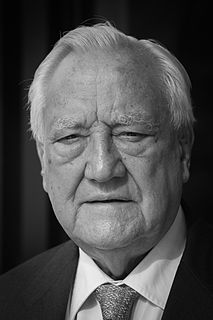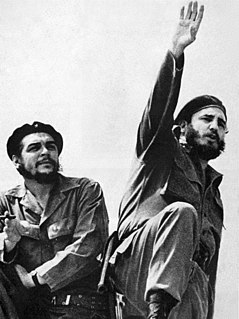Cuba has had a communist political system since 1959 based on the "one state – one party" principle. Cuba is constitutionally defined as a Marxist–Leninist socialist state guided by the political ideas of Karl Marx, one of the fathers of historical materialism, Friedrich Engels and Vladimir Lenin. The present Constitution also ascribes the role of the Communist Party of Cuba to be the "leading force of society and of the state" and as such has the capability of setting national policy. The most recent leader was Raúl Castro, who held the title of First Secretary of the Communist Party of Cuba. As of 2018 Miguel Díaz-Canel is now the president of Cuba.

Christian Poncelet is a conservative French politician. A member of President Nicolas Sarkozy's Union for a Popular Movement (UMP), he was President of the Senate from 1998 to 2008. In addition to being a Senator, he was Mayor of Remiremont (Vosges) and has been the President of the General Council of Vosges.

The National Assembly is bicameral with the lower house, the Chamber of Deputies, having 40 members elected in single-seat constituencies for a four-year term. The upper house, the Shura Council, has 40 members appointed by the King of Bahrain, with the stated aim of giving a voice to minority communities and technocratic experts within the legislative process. Supporters of the system refer to long established democracies the United Kingdom and Canada operating with this bicameralism with an appointed upper chamber and an elected lower chamber. Opponents of this system point out that unlike the bicameral systems in the UK and Canada, the Bahraini system gives the unelected upper house equal or more legislative power than the elected lower house, allowing the King to control all legislation. Opponents also point out that the current system was imposed unilaterally by the King, violating the 1973 Constitution and a 2001 signed agreement with the Bahraini opposition.

Elections in Mozambique gives information on election and election results in Mozambique.

Elections in Guinea-Bissau take place within the framework of a multi-party democracy and a semi-presidential system. Both the President and the National People's Assembly are directly elected by voters.

Elections in Cuba involve nomination of municipal candidates by voters in nomination assemblies, nomination of provincial and national candidates by candidacy commissions, voting by secret ballot, and recall elections. Cuba is a one-party state with the Communist Party of Cuba as the "leading force of society and of the state" under the national constitution, although elections are nominally non-partisan.

The National Assembly of People's Power is the legislative parliament of the Republic of Cuba and the supreme body of State power. Its members are elected from multi-member electoral districts for a term of five years. The Assembly's current President is Esteban Lazo Hernández. The assembly meets twice a year. Between sessions it is represented by the 31 members Council of State. The most recent elections were held on 11 March 2018.

Parliamentary and municipal elections in Mauritania occurred on 19 November and 3 December 2006. At least 28 political parties competed to comprise the lower house of parliament, the National Assembly; Islamist parties were banned, but many Islamists ran as independent candidates. 95 seats in the National Assembly were at stake in the election, along with over 200 local councils.
A parliamentary election to the National Assembly of People's Power was held in Cuba on 20 January 2008. According to the Cuban electoral system, one candidate was nominated for each of the 614 seats in the Assembly, and candidates were elected if they received at least 50% of the vote. The candidates are otherwise proposed by nominating assemblies, which comprise representatives of workers, youth, women, students and farmers as well as members of the Committees for the Defense of the Revolution, after initial mass meetings soliciting a first list of names. The final list of candidates is drawn up by the National Candidature Commission taking into account criteria such as candidates' merit, patriotism, ethical values and revolutionary history.

Parliamentary elections were held in Angola on 9 December 1986. They had been scheduled for 1983, but were postponed due to the National Union for the Total Independence of Angola's (UNITA) military gains in the civil war. The elections were the second elections conducted in the nation after in got independence from Portugal in 1975 and after the 1980 elections. During the period of 1975 to 1980, a civil war was fought between three parties, namely, People's Movement for the Liberation of Angola (MPLA), National Front for the Liberation of Angola (FNLA), and the National Union for the Total Independence of Angola (UNITA) and the disturbance continued to the 90s.
This is a list of members of the Western Australian Legislative Assembly between the 1911 election and the 1914 election, together known as the Eighth Parliament. All members who sat as Liberals, apart from those returned at by-elections, were elected under the "Ministerial" designation at the 1911 election.
This is a list of members of the Tasmanian House of Assembly between the 2 April 1903 election and the 29 March 1906 election.

In Yugoslavia, elections were held while it had existed as the Kingdom of Yugoslavia, the first one being in 1918 for the Provisional Popular Legislature of Serbs, Croats and Slovenes and the last being the parliamentary election of 1938. Women were not eligible to vote. After the 1918 indirect ones, the 1920 parliamentary election was the first direct one. Parliamentary elections were held in 1923, 1925 and 1927, while with the new constitution a de facto Lower and Upper House were introduced in 1931. The 1931 elections were not free, as they were handled under a single-course dictatorship, while the 1935 and 1938 were held under limited basic democratic principles.
Indirect parliamentary elections were held in Cuba on 28 December 1981.
Indirect parliamentary elections were held in Cuba on 27 November 1986.
Parliamentary elections were held in Cuba on 24 February 1993 alongside elections to the fourteen Provincial Assemblies. Following the implementation of a new electoral law in 1992, voters now elected the National Assembly directly.
Parliamentary elections were held in Cuba on 3 February 2013.

Parliamentary elections were held in Cuba on 11 March 2018 to elect members of the National Assembly of People's Power, alongside provincial elections. Prior to the elections, President Raúl Castro declared he would not be seeking a new term, and a new President of the Council of State will be elected by the National Assembly. His deputy, Miguel Díaz-Canel, was subsequently elected as the new president. However, Castro remained the First Secretary of the Communist Party of Cuba, the most senior position in the country.

George Reginald de Silva was a Ceylonese politician.

Parliamentary elections are scheduled to be held in Cuba in 2023 to elect members of the National Assembly of People's Power. They will be the first elections since 1976 that neither Fidel or Raúl Castro are involved.













